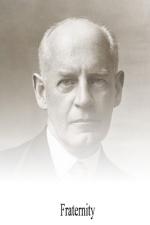Pride was Bianca’s fate, her flavour, and her charm. Like a shadowy hill-side behind glamorous bars of waning sunlight, she was enveloped in smiling pride—mysterious; one thinks, even to herself. This pride of hers took part even in her many generous impulses, kind actions which she did rather secretly and scoffed at herself for doing. She scoffed at herself continually, even for putting on dresses of colours which Hilary was fond of. She would not admit her longing to attract him.
Standing between those two pictures, pressing her mahl-stick against her bosom, she suggested somewhat the image of an Italian saint forcing the dagger of martyrdom into her heart.
That other person, who had once brought the thought of Italy into Cecilia’s mind—the man Hughs—had been for the last eight hours or so walking the streets, placing in a cart the refuses of Life; nor had he at all suggested the aspect of one tortured by the passions of love and hate: For the first two hours he had led the horse without expression of any sort on his dark face, his neat soldier’s figure garbed in the costume which had made “Westminister” describe him as a “dreadful foreign-lookin’ man.” Now and then he had spoken to the horse; save for those speeches, of no great importance, he had been silent. For the next two hours, following the cart, he had used a shovel, and still his square, short face, with little black moustache and still blacker eyes, had given no sign of conflict in his breast. So he had passed the day. Apart from the fact, indeed, that men of any kind are not too given to expose private passions to public gaze, the circumstances of a life devoted from the age of twenty onwards to the service of his country, first as a soldier, now in the more defensive part of Vestry scavenger, had given him a kind of gravity. Life had cloaked him with passivity—the normal look of men whose bread and cheese depends on their not caring much for anything. Had Hughs allowed his inclinations play, or sought to express himself, he could hardly have been a private soldier; still less, on his retirement from that office with an honourable wound, would he have been selected out of many others as a Vestry scavenger. For such an occupation as the lifting from the streets of the refuses of Life—a calling greatly sought after, and, indeed, one of the few open to a man who had served his country—charm of manner, individuality, or the engaging quality of self-expression, were perhaps out of place.
He had never been trained in the voicing of his thoughts, and, ever since he had been wounded, felt at times a kind of desperate looseness in his head. It was not, therefore, remarkable that he should be liable to misconstruction, more especially by those who had nothing in common with him, except that somewhat negligible factor, common humanity. The Dallisons had misconstrued him as much as, but no more than, he had misconstrued them when, as “Westminister” had informed




